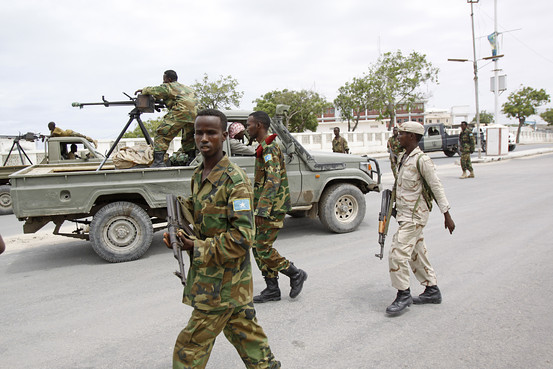
Wednesday August 13, 2014

Government soldiers on patrol in Somalia’s capital, Mogadishu, in May. Associated Press
But events in other areas–including Mali after the French intervention in 2013; Afghanistan after Secretary of State John Kerry‘s latest fire-brigade visit to keep the electoral process on track; and Iraqi Kurdistan after the peshmerga’s counteroffensives of the past few days–give reason to be hopeful about the war on terror.
One of those unexpected sources of promising news is Somalia. Although still a failed state in many ways, Somalia is showing more signs of forward momentum than at any time in the past quarter-century.
At a Brookings Institution forum last week, I interviewed Somali President Hassan Sheikh Mohamed. He was selected by parliament to run the country nearly two years ago after an impressive career in education; he remained in Somalia through the turbulence of the past 25 years.
By many measures, President Mohamed effectively governs only a modest fraction of his country of 10 million. He is the first to acknowledge that even those areas his government controls desperately need economic recovery and development. Accordingly, much of his focus during last week’s Africa summit in Washington was requesting international assistance–not just economic aid but also investment, including by Somalia’s impressive international diaspora. But compared with the anarchy of the 1990s and 2000s, Somalia today is a transforming place.
The nation’s newfound hopefulness begins with progress in security. Aided by an African Union mission now numbering 24,000 soldiers, Mr. Mohamed says the al-Shabaab extremist movement has been deprived of overall control of any of Somalia’s 18 main regions. Uganda, Ethiopia, Kenya and Burundi provide the backbone of the international force–also a testament to Africa doing more these days to help itself. The International Crisis Group, while still very worried about Somalia’s future, documents that the spring offensive by African Union and Somali forces reclaimed 10 major southern towns from extremists; that’s in addition to gains from earlier offensives.
With al-Shabaab still in control of 25 Somali districts, Mr. Mohamed says his goal is to bring that figure to no more than 15 by year’s end. His government’s plan for strengthening its security forces anticipates that one day the African Union may no longer be willing or able to sustain such a large force in Somalia.
Mr. Mohamed is also working hard on the political front. Consultations continue with leaders of Somaliland, the autonomous and generally peaceful region to the north, about finding a model for reintegration. Reconciliation processes continue in the Puntland, also to the north of the capital, Mogadishu, and with clans in other parts of the country, with an eye toward formal constitutional reform that might improve the balance between a stronger central government and Somalia’s traditional clan-based and often nomadic structures. Meanwhile, preparations are beginning for nationwide elections in 2016.
Somalia has a long ways to go toward peace and stability. And al-Qaeda affiliates like al-Shabaab have taken hits in various countries only to re-emerge, and surge, later. But there is some basis for hope in the Horn of Africa. Amid chaos in so much of the world, that good news is worth savoring for a moment.